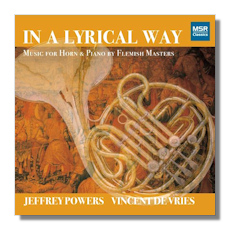
The Internet's Premier Classical Music Source
Related Links
- Weill Reviews
- Latest Reviews
- More Reviews
-
By Composer
-
Collections
DVD & Blu-ray
Books
Concert Reviews
Articles/Interviews
Software
Audio
Search Amazon
Recommended Links
Site News
 CD Review
CD Review
In a Lyrical Way

Music for Horn & Piano by Flemish Masters
- Arthur Meulemans: Prelude (1964)
- Lodewijk Mortelmans: Lyrical Pastoral (1910)
- Marcel Poot: Légende (1958)
- Prosper Van Eechaute: Night Poem (1963)
- Wilfried Westerlinck: Maclou for Horn Solo (1975)
- Paul Gilson: 5 Preludes (1913-14)
- Joseph Ryelandt: Sonata for Horn & Piano (1897)
Jeffrey Powers, horn
Vincent de Vries, piano
MSR Classics MS1266 50:36
Summary for the Busy Executive: Easy listening in an interesting cubbyhole of the repertory.
Flemish music is obscure enough. So is horn music. Here we have Flemish horn music. Of all the composers here, I had previously heard works only by Poot and Gilson. Although it hardly set the world afire, it interested me. Jeffrey Powers was for many years co-principal horn of the Flanders Philharmonic. Since European countries, especially small ones, tend to play their native composers (unlike the U.S.), he worked up an acquaintance with at least some of this music.
There doesn't seem to be a strong national profile to Flemish music. One picks up traits from the larger neighboring countries. Meulemans and Van Eechaute, for example, shows the influence of Debussy, Mortelmans and Ryelandt of Wagner and Brahms, Gilson a strange mix of Wagner and Rimsky. Poot is a classic Modernist of the Paris school, Westerlinck a scion of the postwar international avant-garde. Yet many of them do display a sharply-defined individual streak. The pieces I especially liked come from Poot and Gilson. I thought the only really weak piece was Westerlinck's Maclou. Inspired by the composer's impressions of the Rouen church, it suffers from the problems of many works for solo melody instruments. Despite the sectional nature of the piece, it doesn't really hang together in the listening mind, despite the manipulations in the score. There's a concern for instrumental color and technique, mainly hand-stopping, but despite the difficulty of producing open and stopped sounds practically from note to note, the color changes have little expressive point.
The performers do fine with relatively unchallenging music. Powers clears the hurdles Westerlinck puts up. Sound is very good, particularly the balance between horn and piano.
Copyright © 2011, Steve Schwartz.




















